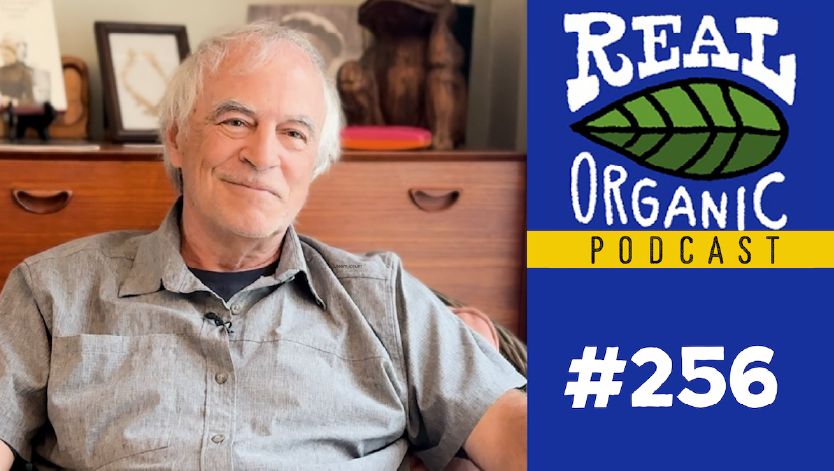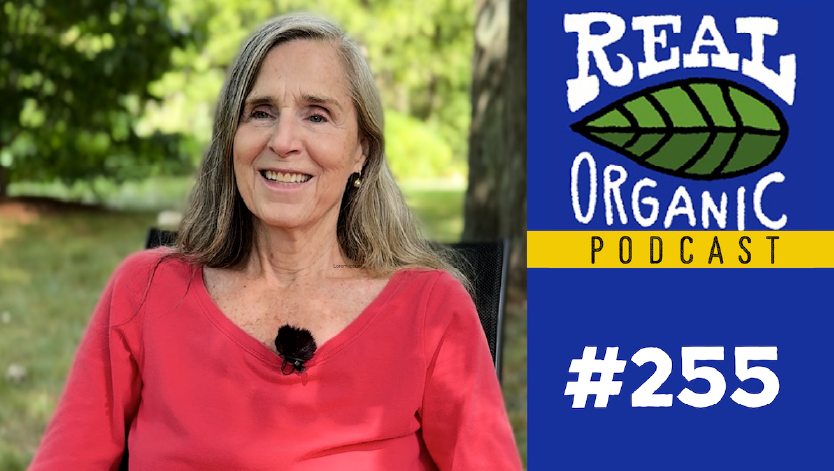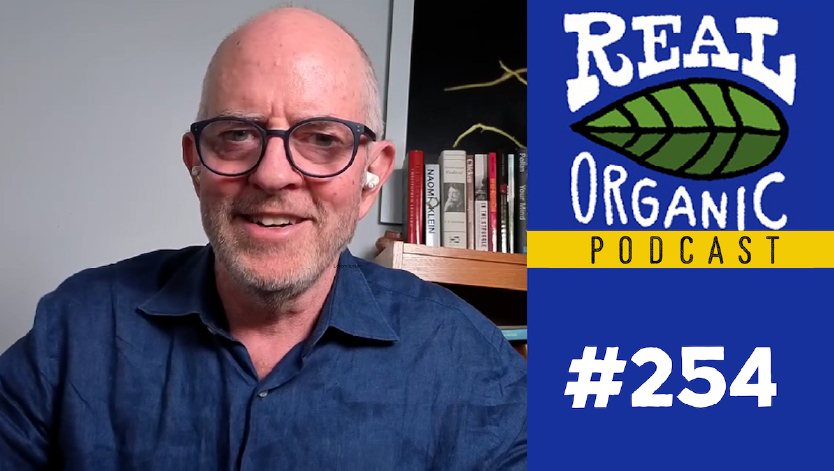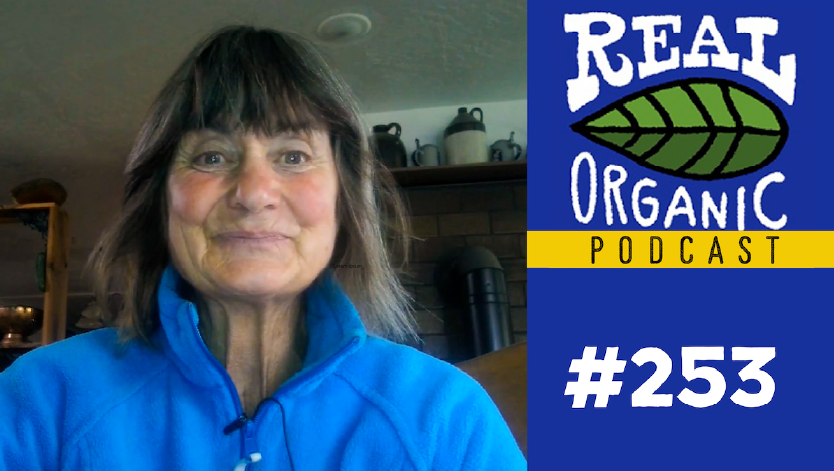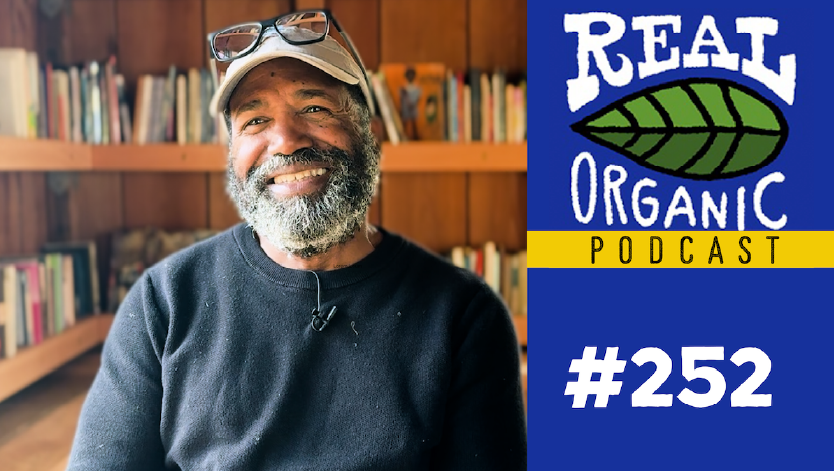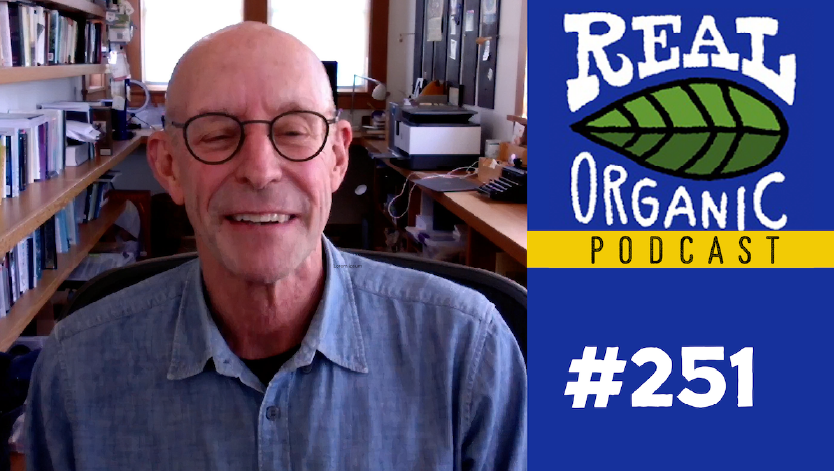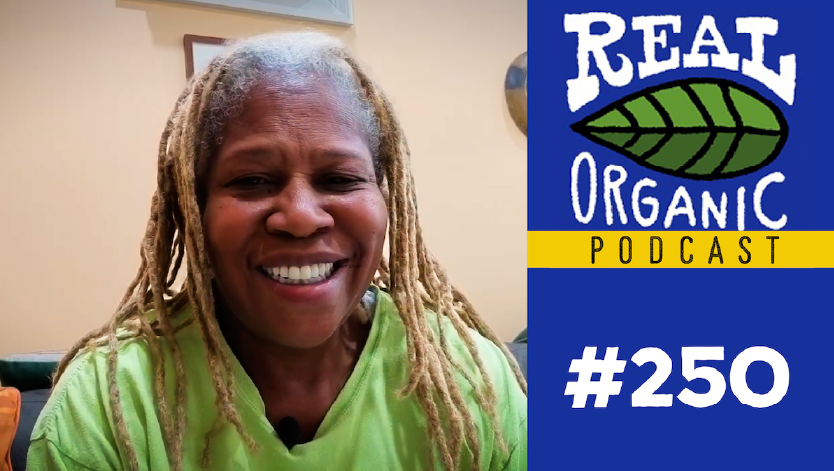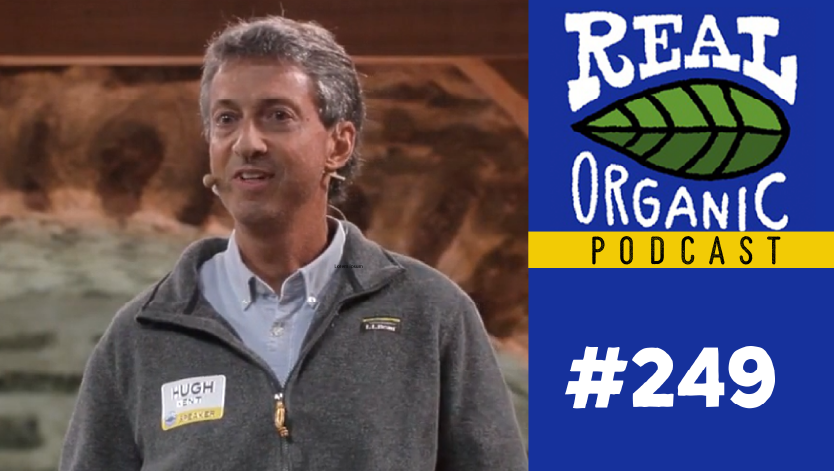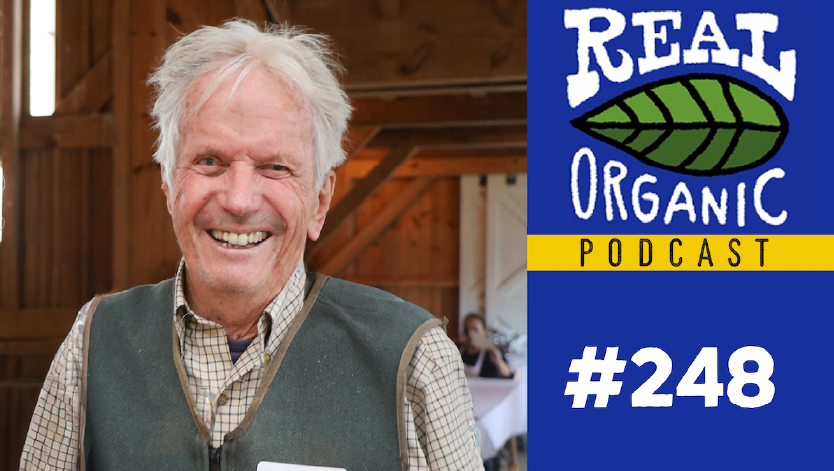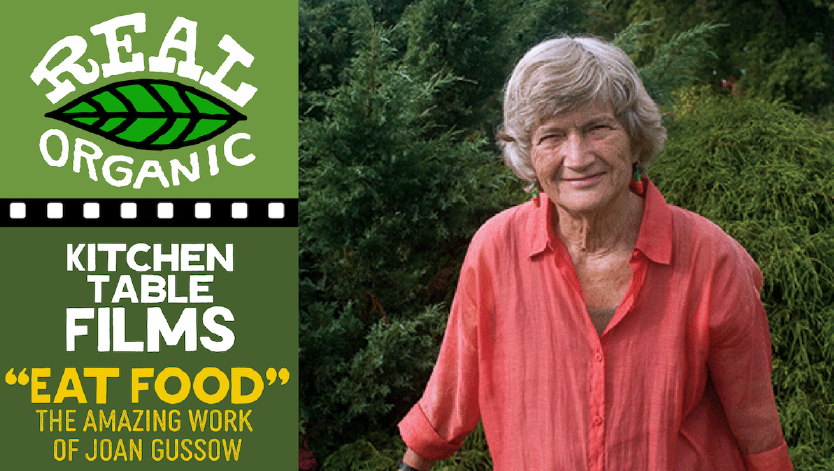Episode #183
Vincent Stanley: Making A Living During The Anthropocene
Welcome! You can subscribe and download episodes of our show through your favorite podcast app.
You can also subscribe to receive the video version of each episode on our YouTube channel.
Our Vincent Stanley interview has been edited and condensed for clarity.
Dave Chapman interviews Vincent Stanley, January 2024 :
Dave Chapman 0:00
Welcome to The Real Organic Podcast. I’m pleased to be talking with Vincent Stanley today, Vincent, so good to see you. This is the first time we’ve actually met in the real world. It’s really wonderful, it’s been virtual. So yeah, great.
Vincent Stanley 0:15
It’s a great place to meet too.
Dave Chapman 0:17
It’s a beautiful farm. I got the tour yesterday and ate my way around the place. Yeah, carrots and cabbage and lots of good stuff. This is my, my favorite farm.
Vincent Stanley 0:33
Yeah, mine, too. I live much of the year just up the road. And this is where we come on Saturday morning when it’s open. Yeah,
Dave Chapman 0:45
So we’ve had a several conversations over the years. And they’ve always been interesting. And I’m sure we’ll touch some of the same points. But I’d like to revisit a few things. Let’s let’s just talk about the future, the responsible company, which which just came out recently, and it’s a redo of a book that you did 10 years ago. 10 or 11? Yeah. So why did you feel the need to make a second edition with a slightly different title?
Vincent Stanley 1:25
I think there were sort of two reasons. One is the changes in the world and, and the changes within the company. So the world is a very different place than it was in 2011, when we were in the process of writing the first book. And I think to some extent, we’ve almost been whipsawed by by events, you had certain positive events in, in the mid 2010s, including 183 nations signing on to sustainable development goals. agreeing what is what does a healthy economy look like? In all places, it wasn’t just like, Okay, this is the prescription that the developed world is going to describe for, for, for for people who are countries that have less money. And then you had an interesting papal encyclical from Francis called by Dr. C On Care For Our Common Home, which he said, It looks like we have two crisis, one, social one environmental, but it’s really one crisis with two faces. And when we’re talking about the poor, the poorest of all is Mother Earth at this point. And we had the Paris Accords, which were hard fought and long coming. And then following that, you know, we had some counter events, we had the election, most prominently the election of Donald Trump. So what we’ve seen in the larger world is, on the one hand, glimmerings of a kind of broad agreement on where the world needs to go if we’re going to save both nature on ourselves, and we’re a part of nature. And then on the other hand, that kind of reaction to be expected. But we’ve also seen as a company, we’ve seen more people come our way. We’ve seen more people say, okay, Patagonia is really providing an interesting example of how to behave in the world. We’ve seen the advance of not without challenge of smallholder organic farming and the rise of local farmers markets, a little bit of a rise, we need far more of it have a sense of place of you know, saying, Okay, this is what we were, we’ve got to globalism, great, we’ve got computers, we’ve got instant communication with each other all day long. But what we’ve lost in a lot of places in the world, is the sense that you can affect your fate as a community, as a group of people in a particular place. And honoring and, and helping to keep alive, the local river, the local forest, all of the things that make up an ecosystem that underlie all of our social and industrial activities. The other thing I think that was big for for Patagonia is actually to get into the food business in a small way with Patagonia provisions. And so you know, for the past 30 years, as a clothing company, we are a global business, we have a very deep supply chain, we don’t make anything. And everything that we’ve done, like switching to organic cotton, or removing neoprene for web, from wetsuits, or taking back products at the end of their life, all of these things are basically reducing the harm we do. None of these are actually giving back more to the planet or more to human communities and we’re taking, but the food business, when you’re dealing with soil, and you’ve got the possibility to actually create topsoil much faster than then the nature can you have this sense of actually giving back. And it also gave us a gate there is the sense of regenerative and in the true meaning of the term, which is that you’re no longer extractive you are, you are returning to nature, what you take from her. But the other thing is as a business model. When we looked at Patagonia provisions, we said, okay, as we develop this business, we’re going to take an interesting position. And what becomes a Patagonia provisions product is that everything that we introduce, has to solve a problem in the food system, or solve a problem in agriculture. That’s the model, not what’s hot in the market, where the hole is from what the competitors make. And I think that that’s, in a way, it’s a North Star for Patagonia as a whole. Because I think this is the best possible use of business is to actually make products in a kind of self sustaining way financially, that can actually help solve the tremendous environmental and social problems we have. So the world is a different place. And I think one of the things we wanted to do, we added a chapter toward the end called Making a living in the Anthropocene. I’ve worked with young people in a number of colleges, but specifically with graduate students at Yale between the business and environmental schools and the Divinity School. And we wanted to talk about, okay, how if we’re going to develop an economy and in service to mother earth and to human communities, what are the opportunities where where should we be putting in our energy, so that also became a part of the book and the reason for the change of the title? We’re talking not just the kind of accounting for how Patagonia got to where it is today. But where the company might be directed in the future. Give them the change in mission statement from two, we’re in business to save our home planet, and also the change in ownership structure that we did last year.
Dave Chapman 8:14
Okay, well, there’s quite a lot there. So it’s such a it’s such a bold mission. If it’s a serious mission, that then it’s a very bold mission to say we’re in, we’re in business to save the mother planet. Yeah. Right. The homeplan. That, because I think that virtually all business is in fact, fairly indifferent to that. Yeah. Or antithetical, or even. Although I, I would guess that most businesses that are highly destructive, aren’t being that way because they intend destruction. Oh, absolutely. Just intend to make money. Yeah,
Vincent Stanley 9:05
or, and they intend to do what they learned how to do. You know, I often come back to this, I’ll love this Aldo Leopold, quote, which is kind of the basic of the land ethic. And he says, That thing is right, when it tends to support the integrity, stability and beauty of the biotic community, which includes us as a part of that. But then when you think about business, to your point, this is not just like people sitting down determining to be evil. Everything we do in business disrupts integrity, stability and beauty of the biotic community. So it’s a huge job to shift away from that. You know, and, and to think about that in terms of our politics, our business and in our, in our community, our civic activity. It’s big to shift away from that but when you start to Look at it in the way of in terms of that land ethic. I think it grounds you in the sense of Okay. That’s a good start. That’s where we need to go from.
Dave Chapman 10:16
It sounds wonderful. Do you think that, you know, the amazing thing is to take it to business? You know, that is normally the province of, you know, crazy loners and religion, that that to say, we’re going to, we’re going to commit ourselves to the common good and hear, you know, as, as the church did in that proclamation there, including the common good to be the planet. Yeah, you know, the whole ecosystem, not just the human social system. So to say, we’ll, we’re going to take this to business. I have so many questions here. But the first one is, Patagonia remains profitable. While while attempting to do this, do you think that there are places where you’re forced to go? Well, we can’t do that, because we’d lose money even though we think we should?
Vincent Stanley 11:17
Yes. But there’s several, there’s several questions involved in that. The first is, you know, the, there’s a kind of basic business responsibility to pay your bills and have enough money to pay your workers. Pay the social insurance tax and all that. I think that we I think even for Patagonia, 15 or 20 years ago, we would have looked at, okay, we do certain things to make, make money, and we do certain things that we think are right, and kind of balances out and we’re doing okay. I think one of the things has changed over the past 15 years is this accumulation of experience, that the more we tackle one problem, okay, organic, we’re going to switch to organic cotton. While it was hugely disruptive for the company, we had to drop up there to the sports where we lost margin, we lost sales for the first couple of years. But we made it work. And we brought the customers along. And then that made it easier to tackle the next question. Okay, how do we? How do we get the neoprene out of wetsuits? How do we address the the question of circularity? How do we take back products at the end of their life to recycle into something new? How do we address the whole problem of overconsumption, or mass consumption of disposable low quality goods? And the more we kind of addressed that I, the more experience we got I think the more we were able to, to move on to do the next thing. But also what shifted is a sense, you know, I wish we had thought of this. Even going back to switching to organic cotton. If we’d had a different mindset when when we did that we were gripped. I mean, we bought the cotton directly from the farmers. We didn’t know what we were doing. We broke our connection to the global supply chain. We were we were terrified, but we say okay, we’re going to do this. What if we sat down and said very calmly, this is an investment we’re going to make. This is something that’s going to cost the company something in the short term, but it’s going to pay off, we’re going to make it pay off in the long run. And I think that’s a that’s an attitude, we need to adopt more on the social side, especially because that usually involves spending more money rather than saving it. And it’s certainly in developing and changing the way we do business, which often requires a learning curve. I mean, I think it’s famous that it takes a new farmer seven years to basically even figure out what they’re doing. Yeah.
Dave Chapman 14:25
Okay. So when you when you went through the things, you started with cotton, you say, well, once we got that done, and then you went to neoprene? Well, to switch organic cotton is not a small thing is a huge thing. Yeah. And you did it for important reasons. But it was also radical. So I just want to go there for a moment. Yeah. And say this is not a small thing to say we’re we’re only going to use organic cotton. It’s a radical dramatic statement. And you made that because you realized how toxic conventional cotton was right? I see it all the time. Vincent that? Here’s my hat. Right. Okay. Yeah. So it’s organic. It’s 70% organic cotton. 30% recycled polyester. Right? We hope. Yeah, we that’s what it says. We hope it’s true. But my point is most people just can’t be bothered they it’s extra money. Yeah. Why would I pay for that? I feel like a schmuck. People are still so far from appreciating how significant the differences between conventional which means chemical cotton, and, and organic. So you, I think your leadership made that that decision first. And then you brought your team along. Right, which was an important story how you did that? Yeah. But it hasn’t been picked up by others that I’m aware of other companies on scale?
Vincent Stanley 16:12
It has. It’s interesting, because organic cotton was a big, I think, absolutely essential for our culture, and for making that change successfully. But in terms of being influential, no, I mean, 1% of cotton grown is organic. And what we’ve seen in the intervening years is that GMO cotton took over the space that organic cotton had promised to occupy. But you know, the world moves in mysterious ways. So the fact that we were able to make this change, and hired us to do other things that have been more influential than the move to organic cotton.
Dave Chapman 17:04
So more influential on the, the mass
Vincent Stanley 17:09
culture that other people would pick up. Yeah.
Dave Chapman 17:12
I’m always pressed by your optimism, you know, because I, I’m like, Yvonne, I have a lot of pessimism. But, but as you say, that’s not that the bias for action is much more important than the optimism and the sense of agency. Yeah. So we’ll talk about that. But, but when we talk about cotton, I just it seems like such a big deal. You know, in all the years that we did the real organic project, and before that, keep the soil organic. I actually never thought about cotton. I just I didn’t go well is is organic, cotton real? Yeah, I knew that organic dairy wasn’t real. I knew that organic poultry wasn’t real. Yeah, I don’t mean all of it. There’s definitely real stuff. But I know that the market is dominated by what I would call fraud. And I’ve heard is, as we all have, have a fair amount of organic fraud in India and Pakistan. So I was like, Oh, God, we aren’t even talking about that. And I think it’s so important, the difference. And the question is, how do you actually create the change, and Patagonia just chose it? Because it’s privately held, somebody made a decision said, This is what we’re going to do. And and it changed. And ultimately, you were able to, at very least break even if not reap a benefit financially. Would you say that Patagonia has earned loyalty? And the customers have felt more connected to the company because of that decision?
Vincent Stanley 18:54
No, I’d say that. That was the that was the success of organic cotton was on the on the basis of attracting people with shared values to the
Dave Chapman 19:07
that’s why I bought a Patagonia jacket. Yeah, it is.
Vincent Stanley 19:10
No and I think I think that’s been true for a lot of people and it also. The story I don’t tell too often, but we had a I do say that when we ordered from farmers in California and Texas, we broke our connection to their global supply chain because those farmers had no relationship to spinners. spinners turn the fiber into yarn. No one would talk to us. You know, we went all around and said, Oh, we hate organic cotton that gums up the machines, it’s sticky. And the person who took us on was ran the largest spinning one of the largest spinning mills in the world in Bangkok. And years later, we asked him, Why did you even talk to us because you were so big and we were so small. He said Well, I guess I’m a closet environmentalist. And I’ve seen this happen, too, that, you know, one of the questions you asked earlier is, if you goes back to this whole whole question of making change that a lot of people will look at what they do, and they’ll understand that they’re creating a particular harm, and they won’t change. And I think that one of the things that, and I would say also, that it would be true at Patagonia, that there are lots of things that we look at, and we say, we don’t know how to change that, you know, we’re dealing with a whole problem of plastics, we can make the change and using 100%, recycled nylon and polyester develop that so it doesn’t lose performance. There are problems we don’t know how to solve. But we, I think we’ve developed a good way to face them to face the problem and say, Okay, this is something that we know is not something that we’re proud to be doing. And we’re going to, we’re going to keep at it, and eventually we’re going to make be able to make a change. That was true with the durable water repellents that persist in the environment. PFA s, it’s been true, we worked with Samsung to it, they were the ones who sort of picked up the ball to come up with a washing machine that will filter out the microfiber waste, that washing machines don’t filter out. So that’s an important part of it. You know, and even going back to the the change in the mission statement I was when we’re talking about we’re in business to save our home planet. I was kind of horrified when when you won’t propose this because I thought this is so aspirational. This language, this is not we’re a clothing company, you know, we’re in business to sell clothes. Are we Is this a kind of form of of greenwashing. And then when I saw it, the company, was it the people take this, they took it seriously? People would say okay, what does this mean for my work? How do I change what I do? How does my team change what it does if we’re trying to fulfill this aspirational mission? So that and that goes back to this whole sense of, of agency and sort of building capacity? To do things that haven’t been done before. It’s easier to pursue the next step, if you’ve been successful at two or three other things.
Dave Chapman 22:54
And you develop a sense of can do based on there was something else that seemed impossible. And you did it, it. That’s right. And it makes you wonder whether there’s anything that’s impossible.
Vincent Stanley 23:07
It does. And also, and but it’s also in relation to something you know, it’s like a runner wants to do better time or, you know, we were talking to Ali at about how long it took to climb the North American wall in the 1950s versus people doing it solo and unprotected in a day. You there’s a there are people we all know that we learn individually, but also teams and groups of people and cultures learn over over time. I think we know less about that, and talk less about that. Yes,
Dave Chapman 23:44
I’ve been thinking a lot about that actually lately, because of course, that’s what we have to do, we can’t. And that’s saying that the lonely heroic gunfighter isn’t important and doesn’t have their place. But ultimately, you know, I was thinking about that, that movie, The Seven Samurai, or The Magnificent Seven is the American version, and they get these Seven Samurai to go to this little higher than to go to a little village and protect them from bandits. But of course, the punch line is that in the end, it’s the villagers who rise up and protect themselves. Right. And that’s how they overcome the bandits. Yeah, and those those Seven Samurai give them the courage and the inspiration to to protect themselves.
Vincent Stanley 24:31
I think that’s an important isn’t that important?
Dave Chapman 24:33
Yeah. So somehow we have to figure out how to get to where we the villagers rise up and do what needs to be done.
Vincent Stanley 24:42
Yeah. I think that first burst of courage is hard to come by for a group. And and Patagonia was really essential that evil was so adamant. And you know, I know. He knew it was a risk for the business, but I think he would he He just put his foot down and said that, now that I’ve learned how harmful conventional cotton has, I just don’t want to be responsible for that. I don’t have to be in the sportswear business, I can make technical clothes and but his willingness to do that, and then when people brought it up, rather than about because he wasn’t the one who actually made it happen, it was all the people working for him. Then that, like the Seven Samurai, everybody learned that that element of courage actually paid off.
Dave Chapman 25:36
Right. I was talking last night with Elliot. And there was a phrase he taught me years ago, when I was very young, and I started to learn how to farm organically from him. And he called it the art of the possible. And it was finding that one example one farmer who is doing something that nobody had imagined, and once you see it, yes, it’s like the four minute mile once somebody broke the four minute mile, no high school kids are breaking the four minute mile. Right. And but but we have our mental barriers that are very real, right? We go well, we can’t do
Vincent Stanley 26:15
that. And we need we need the tangible example. Yes, that’s why I think it’s really important if we’re, we’re and particularly when we’re talking about regenerative organic when we’re talking about activities that can easily be misunderstood or CO opted by others. It’s really important that we provide the experience to people who would be receptive to this, that they understand what a what a real, regenerative organic practices as distinguished from the ad that’s going to be the inauthentic sounding ad that’s going to be produced by by Bayer, right?
Dave Chapman 26:57
No, I know. Yes. Good. We’ll talk about that in a minute. You know, it’s interesting when we were talking with Eliot before, and, and you said, Well, you know, organic, like organic cotton was good, but it wasn’t enough. Yeah. And I’m curious if we’re talking about real organic, what is it? That isn’t enough? You know, when we had our first board meetings, yeah, real, real, real organic project. We started whatever six years ago and David Bronner flew to our first meeting. uninvited, from California. And he flew, and he wanted to meet us. And he’s a wonderful human being, I was so glad that he came. And he asked, well, could we merge? And our board said, No, we don’t believe in your standards. Because the standards were no till. Right. And there were a couple of no till farmers in the world who are organic. Yeah. And everybody was tilling and doing it carefully and doing a good job and increasing the life and they’re still increasing the organic matter. Yeah, I remember Emily Oakley saying, absolutely not. I don’t believe in your standards. Yeah, she was on her board. And so actually, regenerative organic standards have changed to be like ours now. So it’s great. There was a learning that happened. And so um, my question is, do you still think there’s a different I’m not saying it might not be useful to say, let’s talk about the word regenerative because it it has concepts that are important to reflect on, but I’m just curious, do you really think that there’s a difference between real organic and regenerative organic?
Vincent Stanley 28:49
No, but there is a difference between certified organic and regenerative organic?
Dave Chapman 28:53
Absolutely, yeah. That’s why we exist to same reason. Yeah, same reason that USDA certification is not just inadequate, it’s it’s inaccurate, it’s wrong. So
Vincent Stanley 29:07
what we want to what we wanted to adopt because what we shifted to is essentially as to cotton growing practices that didn’t use chemicals. Yeah. And and it’s rare actually. It’s a lot of work to grow cotton with minimal tillage, companion planting, crop rotation, and that in combination so that that’s I think, why why we came to use the term regenerative organic was too short to distinguish that from certified Yeah,
Dave Chapman 29:46
I completely respect Yeah, yeah. I’m, I’m trying to, you know, we had a whole Symposium on is regenerative organic, is organic regenerative. Yeah. And we were seriously asking the question And what we know is that the the word regenerative has become used by many very different players with very different intentions. Yeah. And what to do about that is a is a tough question can’t stop it? No, there’s no law, there’s no legal definition.
Vincent Stanley 30:24
But I think that it becomes incumbent. on us to make it clear what those with the practices are, you know, people always want to, in particularly in a, in a, I don’t want to go go on a rant about how much information people get and how unreliable it is. But the whole movement, I think, toward saving the home planet, and also towards saving the species is toward a kind of acceptance of complexity. And, and, and going away from this idea, okay, we’re gonna have three key performance indicators. And if we don’t, if we hit those, we’re fine. And if we don’t, we’re not, which is? It’s kind of laughable. I mean, you’re It’s like the difference between, we have to understand what your big problems are. Patagonia knows that 97% of our environmental impact is in materials is in the materials that go into the clothes. Good to know. But it doesn’t mean that that’s the only thing we pay attention to, because it’s 97% of our impact you in dealing with the world as it is we have to go back, I think more toward a kind of traditional matriarchal attitude toward managing things rather than patriarchal. You know, the mother, you don’t stop cooking dinner, because the kid is crying and you don’t. You don’t ignore the kid crying because you’re making dinner, you deal with what comes up in front of you, you you take, you take a look at the at the whole. And that’s what we’ve abandoned in so many places in industrial culture, where we’re, we’re, you know, you had the Milton Friedman lesson for 50 years of old, the sole purpose of a business is to return profits to the to the investor. Well, that’s never been the sole purpose of the business. No. And it’s distorted. All of these activities have gone against the Aldo Leopold idea of the integrity, stability and beauty of the bad community in favor of these kinds of careful, chickens are perfect or good, careful, careful, cattle are a perfect example of kind of a producing or kind of industrial horror that is not readily recognized, because people don’t make the connection. They still think of, of a pork chop as coming from a pig that was raised on a farm rather than one that’s raised in an outdoor factory.
Dave Chapman 33:22
Yeah, well, and of course, because they’re shown countless images to support that. You know, it’s not a mistake that they believe that but we’re in a time where the the means of persuasion are getting more and more sophisticated in terms of persuading us, yeah. To do what we what we think is the right thing, but it isn’t at you know, it’s greenwashing has gotten really high. Let’s, let’s talk a bit about their two examples that you brought up before. I don’t I don’t mean examples of greenwashing. But examples of complicated companies. And one was didn’t own. Yeah. And one was Walmart. And I find them both riveting. And because I feel like I’m, I’m, I’m facing some harsh truths. And I’m trying to find what’s the best way that we use our energies. And I am so impressed with what has happened at Patagonia the path that was taken towards creating some real changes. And hopefully, you become one of the Seven Samurai and everybody else rises up and goes, I guess we can do it. It becomes the art of the possible but I look at the unknown and I think they were trying to do the same thing. You know, they’re they’re, they’re kind of a dessert company. Really. I mean, I mean, their yogurt is pretty sweet. You know? But under Emanuel forbear, I believe that he believed that he wanted to change their mission. Yeah. And genuinely become actually regenerative. I think he didn’t use that word. But I think that that’s what he imagined and work towards. And I was quite inspired by him. i Yeah, the guy could speak. Yeah. Right. And he was talking about decentralizing and and localizing the food system as much as possible. Yeah. And so making the food much more regional, and its sourcing and distribution. These are very big aspirations for A, the second biggest dairy company in the world, big, big multinational. And, of course, when they had a couple of down quarters, he was fired. And, as far as I know, all of his vision was fired to. I’m sure there were some changes residual, but I think it was really back to business as usual. I’m just curious, what do you think about that?
Vincent Stanley 36:11
You know, I worried about that. When Emmanuelle was fired that I had a conversation with Lorna Davis, who was really instrumental in making the know North America, a B Corp. And she had an interesting thing to say she’s they thought it would take three years after they purchased greenwave. I think that was the name of the company, they bought white wave white or white wave, the ones that had, I’m thinking of another operation. Yeah. And she said it was they did it in one year, because of the devotion of the younger employees to the project, were really inspired by it. So what a manual they they changed
Dave Chapman 36:57
the culture of LightWave. You know, it was
Vincent Stanley 37:01
they were the ones who, who instead of a B Corp certification, taking three years they did it. But she said, you know, once you go down that path that Emanuel had led the company on, it’s really hard to go back entirely when I’ve seen you know, Paul Polman was really understood what’s happening in the world when he ran Unilever. And Unilever has had gone kind of back and forth since he left. What I saw with Walmart, was they made these very ambitious goals in 2007 2008, toward changing their practices, especially in terms of the energy they use and all that. They’ve retreated from them. But they’ve also they never go away. Every second CEO that comes in reinstate something, and I think because it does become part of the culture, it does become part of the understanding. So So I’m not saying that to, to gloss over. I’m just saying I don’t think I don’t think it goes away. And I’m wondering if there’s a lesson that people can take from businesses and say, you know, to start maybe looking at how to bring that back into a company that’s retreated. I know from Patagonia’s experience, it particularly in the earlier days, we’d get people in who came from a bigger company. And we bring in people from a bigger company, because we’d grown and we needed to change our systems. And we needed somebody who understood the systems that we needed to adapt. But they’d come in and they’d say, I don’t know how to function in this culture. So I’m going to rebuild it in my image. Those people were never there after a year or two. But I can see that happening with other companies too, particularly well entrenched, larger companies, and they’re going down a path and people get scared. But again, I would stress that it doesn’t go away entirely. It’s it’s there like a germ within the company. Once people have had the experience of actually living out their values, being closeted environmentalists or whatever. Being able to bring that to work. They want to people want to bring that back.
Dave Chapman 39:57
I think that’s true. My this One of what goes on, though is that it’s ultimately not personal. And you know, Fred Kirshen is famous replied to the question of, what would you do if you were secretary of agriculture? And he said, Well, that depends on how long I wanted to be Secretary of Agriculture. Yeah. Because if I did what I really want to do, I would be about 10 minutes, and then I’d be gone.
Vincent Stanley 40:21
Well, that’s a good point. And I think, I also think it should change what our expectations are. I think it’s really important for Fred Kirshen men to have done the work that he did, rather than become Secretary of Agriculture and do 10% of what he knew he what he wanted to do, right. So I think that we really do need to return to the local, we need to return to the small scale, we need examples that are replicable, and then also resonate with people. But I’m also, you know, for these big guys, they can have a huge short term effect on reducing the harm that’s done. Yeah. You know, and so I don’t want to, I don’t want to give them a white hat. I don’t want to make ads for them. But I don’t want to discourage them from going down the line as they make discoveries that reduce the harm they do, or to increase the possibility
Dave Chapman 41:25
that this is the question for me. This is the question and, you know, so Rodale is doing a joint venture with Cargill, on, I don’t know, 100,000 acres, taking it organic, and you go, well, that’s got to be a good thing. And, you know, there’s a lot of that kind of partnering going on, with companies that were considered to be extremely bad players. And Cargill is interesting because it’s still privately owned. So it has the possibility of doing what Patagonia or Bronner’s have done. It’s still owned by some humans. Yeah. And not by, you know, a public public corporation with all those shareholders. But Leopold course statement, if, if something. If something doesn’t work, something is too big. And Elliott’s been telling me that for years, but I’ve been thinking about it a bit more lately. Yeah. And I’ve been a bit inspired by by Zephyr, teachout spoke, break them up. And it is her contention. And I would say, Michael Pollan is right there with her that when you have a concentration of power and capital in a few hands, inherently, it becomes anti democratic, inherently, it becomes destructive to our social good. And I didn’t have the language for this for a long time. I mean, people could say it, but it just, it just sounded angry. They just you know, they just sounded like down. Another thing, but I’m really seeing it so clearly now. And I’m seeing it play out right in front of my eyes. It’s interesting. A monopoly a monopsony is when you have a monopoly in, in the market space, as opposed to the production space? Yeah, they’re both happening. So Walmart is a monopsony. It’s a monopoly in the marketplace. And as a result, they control how food is grown in America by the demands they put on them around what they will pay for the product. So the producers had no choice. But to make it cheaper than they thought was humanly possible there, we’re seeing the downside of the art of the possible, making it infinitely worse over and over. And, and at the same time, I sent you that interesting article. They’re putting money into regenerative agriculture saying we can’t be so short sighted in our in our outlook. Well, they’re the ones creating the outlook. Now, you could say it’s not their fault. They’re just part of the system. But the fact is, that they’re a huge part of the system. And that is what’s happening. They’re creating a thing I would never ever ever sell to Walmart. Yeah, I wouldn’t even consider it, nor would they consider it. Yeah, they have no way of dealing with a farm as small as I am. But that would be like putting your head in the jaws of a shark. For me, it would be very dangerous. Yeah. As a business. So I’m trying to make sense of this that that I’m not sure that Walmart can get it right from my purse. spective?
Vincent Stanley 45:00
No, I don’t think they can. So I think that we have, you have to lower our expectations of what those companies can do. And at the same time, double down on what we think is the authentic version of what we’re doing this right. So, you know, community gardens, farmers markets fighting every seven years for a better Farm Bill, I mean, there are lots of there are lots of things that can be, can be done to draw people away from what you’re talking about. With is a real basic problem in the economy. For the past 50 years, wages didn’t increase. And you the 1/3 of people who are college educated, if done very well, then two thirds have not done well. And they’ve been rewarded with cheap disposable goods and food doesn’t food and clothing among them. And that’s a real, that’s, that’s been a real problem for the for the earth. And it’s a real problem for the, for the countries in which those the food is grown and, and closer, so. So we need to shift away from that, but it’s a, it’s a radical shift. And I think in order to start to make that shift, not that we all have a tremendous amount of time, is to come up with the real thing. To come up with examples that take people away. I mean, I was, we were talking earlier. I’ve just learned not to buy an organic cotton. If it says gonna, I’m sorry, an organic carrot, if it says it’s grown in Mexico, and not because of what I think about the conditions, I just know that that carries not going to taste any better than the industrially grown chemical carrot. It’s just it’s not it’s not the real thing. And when we look at food, I think, you know, he was often said the trifecta is nutrition, taste and, and soil health. And that’s something that we have to offer people, it’s going to be more expensive than the Walmart carrot.
Dave Chapman 47:34
Okay, let’s talk about that. If we could, yeah. There’s a certain playbook of charges against, you know, organic, and one of them is, oh, it’s for the elites, right? It’s too expensive, you know, working people can’t afford it. This is usually set by people who work for elites, in my opinion. Yes. It’s like, does anybody not notice like who’s painted this ad? But I’m just curious, that is a true thing that if something costs more, it is easily portrayed as being elitist because it is less accessible to people with limited income. And the same thing that might be said of organic food might be said of Patagonia’s products. So what do you say to that?
Vincent Stanley 48:27
Well, I think they’re almost the same thing. It’s interesting for me because so Patagonia is based in Ventura. I live in Santa Barbara, a lot of the time. We had a very interesting farmers market there for a long time I was once reaching for tomato. And to my right was the mayor of Santa Barbara reaching for the same beautiful tomato and to my left was Julia Child. And Julie, I got the Jamaica. But that you know, that farmers market, I’ve seen the evolution of customers over the years. And it was all white people well dressed in Patagonia clothes for a long time. And now I see a lot more Hispanics, I see a lot more people who look like working people at the farmers market. And they’re there because of the quality of the food. Yeah. In clothing. Don’t get me going on fast fashion, where the average go for an item is worn five times and then and then thrown away. Yeah, not even given a goodwill like we all did when we were younger. You’re there’s no there’s no. There’s no impetus or there’s there’s no motivation to create a quality product there. So you’re going to be used five times. So what’s the difference between spending a couple $100 on a jacket that’s going to last you 10 yours and spending a couple of $100 on five jackets that you’re going to wear on on 10 Saturday nights, right? And so I think there’s a mindset there. Then the same with food, you know, we’re we’re you know, if you want to cheeseburger and fries and a supersize shake, well, you can get that very cheaply in any kind of fast food outlet you care care for. If you want a but if you want to eat well, you could also eat well, for you know, I people have demonstrated that you can eat a lot of really good animal products, but you can you can you can eat a good diet on on for a fairly small amount of money.
Dave Chapman 50:59
organically. Yeah, that’s right. Well, and you can eat a very bad diet. Yeah, inexpensively or expensively. I see somebody walking out with a big bag of Doritos. It’s not really food, no stuff, but it is dealt with as food. It’s, it’s what people fill themselves up on. I don’t mean to sound. Well, you know, I, I do have strong beliefs around food and nutrition and health. And I see the lot of food that that we eat in our culture is very bad for us. It’s not neutral, it’s bad. You’d be healthier, fasting. And and obviously, there are a lot of people who are stuck in that fact that the wages haven’t gone up in 40 years. And, you know, they’re working two jobs or three jobs, and they they’re struggling to get by, and they eat what they can when they can. But yeah,
Vincent Stanley 51:56
and you think of it as abundance, you know, a big a big cheeseburger generous, helping your fries and Anna 67 ounce Coca Cola, you think of that, you start to think of that as abundant. So so what we need to do is to produce an idea of abundance that people respond to, and they say, Well, yeah, this is more abundant than when I came to accept as the fruits of the earth. Yeah.
Dave Chapman 52:35
You mentioned that the Gnome, got their B Corp status, and only one year are down in North America. And after a bear was dismissed, they went on to drop 97 Small farms in New England didn’t impinge on their B status at all. And so I see that that’s wonderful that people are starting to think about that. But I also see it’s certainly not a firewall against what I would call bad behavior. You know, because they were replacing that with CAFOs. That’s why milk is so cheap, just because milk is being certified as organic that’s coming from CAFOs. And it depresses the whole the whole market.
Vincent Stanley 53:20
Yeah, there’s no, no, there. No, there are no magic bullets.
Vincent Stanley 53:30
But again, I think it’s a question of what even with the with the B Corp movement, it, it puts the discipline and put some discipline on these larger companies when they become a B Corp. But it’s no guarantee, especially in decisions that are uncertain decisions that are made that that’s that that’s going to be a good decision.
Dave Chapman 53:57
So what will give you’ve lived a life as a business person, but also as a activist, I think and as a very responsible human being trying to make our planet a better place to live for everybody. What what do you right now see as the acupuncture point, it’s the right place to put the energy. Amory Levin said, describe the Rocky Mountain Institute is, is doing instant institutional acupuncture, and looking for the inflection points where they thought with a little bit of influence and effort, they could create a fairly big change. Yeah.
Vincent Stanley 54:46
I guess I see it a little bit differently. I have friends who work at RMI and I guess I’m more interested in How how do you create a feeling or create a story that people respond to? When when you have something genuine that can be replicated? It’s interesting when you say that, you know, the Les Paul core comment about it, something is wrong, it’s too big. There’s an almost yin and yang, opposite insight from Dwight Eisenhower, who was the logistician in World War Two who said, Whenever I can’t solve a problem, I make it bigger. That’s right. Because then I can begin to see the edges of it. So I think I think to some extent, what we need is, is is to, to really face our world. And to and to think very, in a very large way about what’s wrong is when we talk about the integrity of the biotic community, and whether our actions are tend to tend to help or tend to hurt that. And then on the other hand, I think we need what we’ve neglected, is the small scale the local, we’ve neglected community, at the kind of stressing in the US the both the individual on the one hand, and then the large scale activity on the other. So I don’t know where the inflection points are. I do know that, you know, we talk a little bit in the book about and I work with young people, they want to know, they want to go to work for a good company, or they want to go to work in a good activity. You know, see one day is the electrification of the economy, which, you know, Rmi is all about, but it’s not necessarily the only question and there are some. The more you do, the more you learn what the problems are, cobalt, you’re getting rare earth materials out of the Congo, cetera, et cetera. But electrification to the economy is important. I think that defensive democracy is really important, even though people vote they’re often vote in a way that I don’t like, but just the idea of democracy of includes that idea of agency of defending the place you live. And I think that face to face, democracy works better than over the internet. Because you’re, if you’ve got a human being or classroom in a classroom, you there’s less tendency to demonize. I think it’s so many young people I run into are really interested in agriculture, and shifting the kind of urban rural divide where we’ve had a kind of Internal Colonialism over the big city over rural life. How do you how do you? How do you change that? So you don’t have a kind of populist revolt of the of rural people that you have, that you’ve had all over the world, actually, in rural places against urban people who make money? Those are all those are areas in which I think we need a lot of different activity, we need a lot of activity in finance, to get away from delivering the highest possible returns to return families, to how do we how do we finance activities that we need? Where we traditionally, not a lot of people who are in the financial business know how to do that, because they’ve been trained to do something else and they are experienced in doing something else.
Dave Chapman 59:08
These are, these are good, good answers. Would you say that? I’m thinking you’re actually working on developing a leadership and organic Leadership Initiative. And as I listened to you, I’m struck again, that perhaps one of the critical things is to develop that sense of agency, that people are so overwhelmed by the enormity of the challenge is that they become depressed and they shut down and I see it a lot. And I actually feel some pressure not to beat breast. But you’re, you know, what should we like, I don’t know. I’m depressed too. And I’m overwhelm, too. But I, I, you know, I do think it is important that we we don’t necessarily have the we certainly don’t have the power to stop Cargill, we don’t. And Seth Godin generously reminded me of that right in one conversation, when we do have the power to do something important.
Vincent Stanley 1:00:19
Yeah. And we have the we have the power to eventually make. I hate to use that word, but we do have the power to make Cargill. Irrelevant. Irrelevant. Irrelevant. That’s right. And I think that that’s what we need to do. That we, or that, you know, Cargill has to pursue a model that’s actually consistent with what we’re advocating what we’re trying to bring them out.
Dave Chapman 1:00:45
Sure. And that’s at Cargill, A will be something now we’re
Vincent Stanley 1:00:50
when Emmanuel fiber was trying to do that had to know, and I’m sure there are still people that don’t own trying to trying to do that, or at least trying to be less harmful than a traditional company. Yeah.
Dave Chapman 1:01:05
All right. We, we’ve, we’ve run our course Linson. But yeah, and
Vincent Stanley 1:01:11
I hate to sound like, Yeah, I hate to sound optimistic. I’m not really arguing for optimism. I’m arguing for, for what? Going going again, back to that alto, let Baldwin, how do we proceed? And then what I see with with younger people, is the, you know, the opportunity to take their energy and their intelligence and they all have a lot of social skills and my generation grew up in. Of, yeah, there are lots of things that can be that can be done. Most of them are not going to make you rich, but they are going to create that sense of the possible for somebody else. Patagonia, that is now viewed. I think we’re Axios Harris poll said we were the most trusted company in the United States. Now, take that with a grain of salt, because a couple of years ago, it was Clorox. But, but I think that I think that says something about that. That that’s all that that’s something. Yeah. Do. And we were the sixth most trusted company among Republicans that I was really proud of, because that means they’re forgiving us.
Dave Chapman 1:02:49
All right. Vincent Stanley, thank you very much. Thank you.


